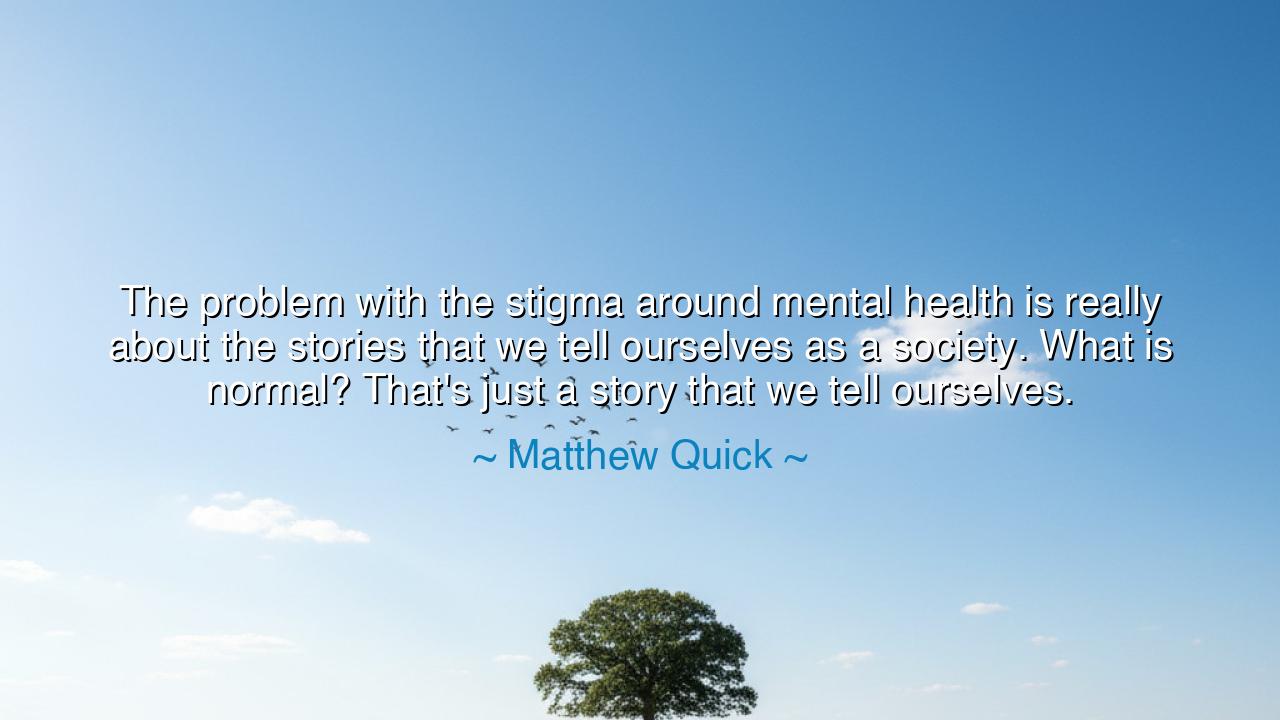
The problem with the stigma around mental health is really about
The problem with the stigma around mental health is really about the stories that we tell ourselves as a society. What is normal? That's just a story that we tell ourselves.






The writer Matthew Quick once spoke words that strike like a soft thunder in the heart of humanity: “The problem with the stigma around mental health is really about the stories that we tell ourselves as a society. What is normal? That’s just a story that we tell ourselves.” Beneath these words lies an ancient truth—the recognition that all civilizations, from the dawn of time, have lived not merely by laws or customs, but by stories. These stories shape our reality, defining who is strong, who is weak, what is right, and what is normal. Yet when those stories turn cruel, when they cast shadows on the minds of those who suffer, they become chains that bind the spirit and silence the soul.
In the days of the ancients, the healers of the mind were revered as those who touched the unseen. They did not speak of stigma; they spoke of balance between body, mind, and spirit. But as centuries passed, the world began to fear what it could not see. The sorrows of the mind were hidden behind closed doors, and those who trembled beneath invisible burdens were called “mad” or “broken.” Thus, the story of normalcy became a cage—a tale written not by truth, but by ignorance and fear. Yet as Quick reminds us, this idea of “normal” is no divine law carved into stone. It is merely a story, and like any story, it can be rewritten.
Consider the tale of Vincent van Gogh, the painter whose soul burned with divine fire. In his lifetime, he was dismissed as unstable, misunderstood, and strange. His mental anguish was seen as madness, not as the voice of a spirit that felt too deeply. But now, generations later, the world beholds his art and calls it genius. What changed? Not the man himself—he was always what he was—but the story that humanity told about him. Once condemned, he is now celebrated. Once pitied, he is now praised. Thus, we learn: the difference between stigma and reverence lies not in the soul itself, but in the narrative that surrounds it.
The stigma of mental struggle is the shadow of misunderstanding. It thrives where compassion falters and where fear dictates thought. To label others as “abnormal” is to forget that every mind walks its own labyrinth. Some paths are lit with calm sunlight; others twist through darker corridors. Yet all are human. The heart that suffers from sorrow is not lesser—it is simply fighting a different battle, one unseen but no less real. When we name it shameful, we deny the courage it takes to endure such storms. When we hide it, we hide a part of our collective soul.
What, then, is normal? Is it conformity to what the crowd accepts? Is it the quiet mask that hides despair behind smiles? Or is it perhaps an illusion, a fragile idea born from our longing to belong? The sages of old would say: “Normal is the dream of the fearful; truth is the freedom of the brave.” The world has always been shaped by those who dared to be different—by the poets, the thinkers, the wanderers whose minds danced beyond the edges of what society could understand. To call them “abnormal” is to call the stars strange because they burn differently than the sun.
The lesson of Quick’s words is both tender and powerful: we must rewrite the story. We must speak of mental health not as weakness, but as a part of the great tapestry of the human experience. Each heart carries its own rhythm, each mind its own song. To honor this diversity is to honor the essence of life itself. The story of “normal” must give way to the story of understanding—where compassion replaces judgment, and where silence gives way to truth.
So let this teaching pass from one generation to the next: when you meet someone who struggles with their mind, do not turn away. Sit beside them, listen, and speak with kindness. Let your words be gentle, your presence steady, your heart open. Remember that the world is not healed by perfection, but by empathy. Rewrite the story that your heart tells of others—and of yourself. For in doing so, you will break the chains of stigma, and free the human spirit to shine in all its wondrous, imperfect beauty.
And thus, when the day ends and silence falls upon the earth, may we remember: what we call “normal” is but a fleeting tale. But love, understanding, and truth—these are eternal. Let us build our world upon them, and watch the walls of shame crumble into dust.






AAdministratorAdministrator
Welcome, honored guests. Please leave a comment, we will respond soon